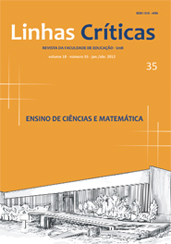Conceptions and practices of experimentation in the firstyears of elementary school
DOI:
https://doi.org/10.26512/lc.v18i35.3844Keywords:
Experimentation, Science Education, ConstructivismAbstract
This study is the result of qualitative research of school procedures and teachers’ conceptionsabout experimentation, instrumental activity, or practical classes. We have interviewedteachers working in the first years of elementary school in the town of Rio Grande/RS andobserved their classes, in order to analyze the way in which experimentation is used in thescience teaching and learning process. Through the collected data we perceived that thetypes of materials used, the daily activity of the students and the possibility of constructinglearning are important points for the teacher when dealing with practical activities in class.
Downloads
References
BAGGIO, André. Como alguém pode aprender algo que não conhece? In: DANYLUK, Ocsana Sonia;QUEVEDO, Hercílio Fraga de; MATTOS, Mára Beatriz Pucci de. Conhecimento sem fronteira.v. 4.Passo Fundo: UPF, 2006.
BARDIN, Laurence. Análise de conteúdo. Lisboa: Edições 70, 2002.BARROS, Aluísio et al. O Mestrado do Programa de Pós-graduação em Epidemiologia da UFPelbaseado em consórcio de pesquisa: uma experiência inovadora. Rev. bras. epidemiol., São Paulo, v.11., supl. 1., maio 2008.
BECKER, Fernando. Modelos Pedagógicos e Modelos Epistemológicos. Educação e Realidade,PortoAlegre, v. 19 (1), 89:96, jan./jun. 1994.
________. A epistemologia do professor: o cotidiano da escola.13 ed. Petrópolis: Vozes, 2008.
BOGDAN, Robert; BIKLEN, Sari Knop. Investigação qualitativa em educação.Porto: Porto Editora, 1994.
BORGES, Regina Maria Rabello, MORAES, Roque. Educação em Ciências nas Séries Iniciais.PortoAlegre: Sagra Luzzatto, 1998.
________. Repensando o Ensino de Ciências.In: MORAES, Roque (org.) Construtivismo e ensino de Ciências: reflexões epistemológicas e metodológicas. Porto Alegre: EDIPUCRS, 2008.
BRASIL. Secretaria de Educação Fundamental. Parâmetros Curriculares Nacionais: ciências naturais(1ª a 4ª série). Brasília: MEC/SEF, 1997a.
________. Secretaria de Educação Fundamental. Parâmetros Curriculares Nacionais: meio ambiente,saúde (1ª a 4ª série). Brasília: MEC/SEF, 1997b.
CARVALHO, Anna Maria Pessoa de et al. Ciências no Ensino Fundamental:o conhecimento físico. São Paulo: Scipione, 1998.
COLL, César. Aprendizagem escolar e construção do conhecimento. Porto Alegre: Artes Médicas, 1994.
GIL, Antonio Carlos. Métodos e técnicas de pesquisa social. São Paulo: Atlas, 1999.
GONÇALVES, Fábio Peres; GALIAZZI, Maria do Carmo. A natureza das atividades experimentais no ensino de ciências: um programa de pesquisa educativa nos cursos de Licenciatura.In: MORAES,Roque; MANCUSO, Ronaldo (org). Educação em ciências: Produção de currículos e formação de professores. Ijuí: Unijuí, 2004.
HALLAL, Pedro Curi et al. Consórcio de pesquisa: relato de uma experiência metodológica na linha de pesquisa em atividade física, nutrição e saúde do curso de mestrado em Educação Física da UFPel. Revista Brasileira de Atividade Física & Saúde, Pelotas, v. 14 (3), 156:163, set./dez. 2009.
HARRES, João Batista Siqueira. Natureza da Ciência e implicações para a educação científica. In:MORAES, Roque (org). Construtivismo e ensino de Ciências:reflexões reflexões epistemológicas emetodológicas. Porto Alegre: EDIPUCRS, 2008.
LÜDKE, Menga; ANDRÉ, Marli. Pesquisa em educação: abordagens qualitativas. São Paulo: EPU, 1986.
MOLL, Jaqueline; BARBOSA, Maria Carmem Silveira. Construtivismo: desconstituindo mitos e construindo perspectivas. In: BECKER, Fernando; FRANCO, Sérgio Roberto Kieling. (org.). Revisitando Piaget. Porto Alegre: Mediação, 1999.
PIAGET, Jean. A construção do real na criança. 2 ed. Rio de Janeiro: Zahar, 1975.
________. A Tomada da Consciência. São Paulo: Melhoramentos e EDUSP, 1977.
________. O nascimento da inteligência na criança. 4 ed. Rio de janeiro: Editora Guanabara S.A., 1987.
ROSITO, Berenice Alvares. O ensino de ciências e a experimentação.In: MORAES, Roque (org.).Construtivismo e ensino de Ciências: reflexões epistemológicas e metodológicas. Porto Alegre: EDIPUCRS, 2008.
SILVA, João Alberto. Escola, Complexidade e Construção do Conhecimento. Pelotas: Editora e Gráfica Universitária, 2010. v. 1. 170 p.
Downloads
Published
How to Cite
Issue
Section
License
Copyright (c) 2016 Linhas Críticas

This work is licensed under a Creative Commons Attribution 4.0 International License.
Authors who publish in this journal agree to the following terms:
-Authors maintains the copyright and grants the journal the right of first publication, the work being simultaneously licensed under the Creative Commons Attribution License which allows the sharing of the work with recognition of the authorship of the work and initial publication in this journal.
- Authors are authorized to enter into additional contracts separately, for non-exclusive distribution of the version of the work published in this journal (eg publish in institutional repository or as a book chapter), with acknowledgment of authorship and initial publication in this journal.
-Authorers are allowed and encouraged to publish and distribute their work online (eg in institutional repositories or on their personal page) at any point before or during the editorial process, as this can generate productive changes as well as increase the impact and the citation of published work (See The Effect of Free Access).



